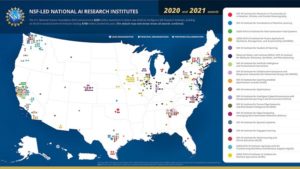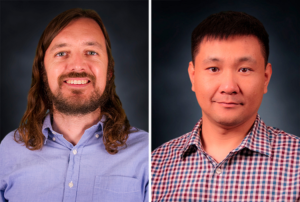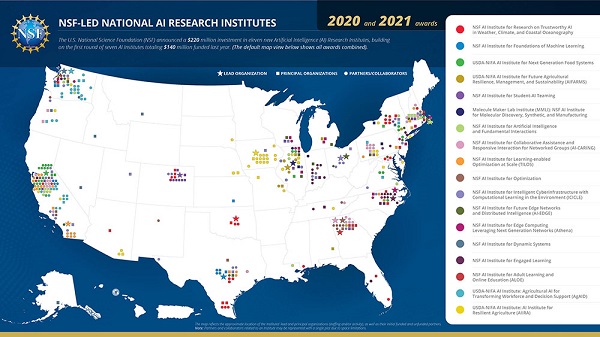
NSF announced a $220 million investment in 11 AI research institutes, building on seven institutes totaling $140 million last year. (This map shows all awards combined). [Credit: NSF]
“Artificial intelligence is becoming very important,” Panda said. “A lot of people are using it, but it is still limited to advanced technical people. How do we take it to the masses? That’s where we want to take AI — a plug-and-play version which will be democratized so that anybody can use it over the years.”
ICICLE is one of 11 new NSF National Artificial Intelligence Research Institutes announced last week by NSF. The combined investment of $220 million expands on the seven institutes established last year. The institutes will act as connections in a broader nationwide network to pursue transformational advances in a range of economic sectors and science and engineering fields — from food system security to next-generation edge networks.
TACC will be involved in fundamental research and development efforts to build this intelligent cyberinfrastructure. This includes high-performance model training, and scalable and high-performance data management. In addition, TACC will build the software platform and architecture for the institute.
“The ICICLE platform will be open source — one of our primary goals is to create unifying standards that can break down barriers to accessing and successfully using AI,” said Joe Stubbs, manager of TACC’s Cloud and Interactive Computing group.

(Left) Joe Stubbs, Manager, Cloud and Interactive Computing group; (Right) Zhao Zhang, Computer Scientist, Scalable Computational Intelligence group
Many of the successful prototypes and capabilities built by the institute will be integrated into TACC’s Tapis framework. Tapis provides a hosted, web-based programming interface for securely building and managing distributed computations running on a wide range of platforms from edge devices to supercomputers.
Zhao Zhang, a computer scientist in TACC’s Scalable Computational Intelligence group, will lead research of high-performance model training, edge intelligence, control and coordination, and performance modeling for the project.
“ICICLE will enable plug and play AI, hiding a lot of the technical obstacles from researchers, and making it easier to accomplish their science,” Zhang said.
The Ohio State-led ICICLE team will also work in collaboration with the Ohio Supercomputer Center, Case Western Reserve University, Iowa State University, Indiana University, University of Wisconsin-Madison, University of Utah, University of Delaware, University of California, San Diego/San Diego Supercomputer Center, University of California, Davis, Rensselaer Polytechnic Institute and IC-FOODS.
source: Faith Singer, TACC




